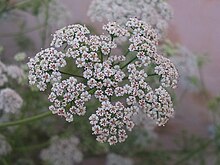Ajwain
| Ajwain | ||||||||||||
|---|---|---|---|---|---|---|---|---|---|---|---|---|

Ajwain fruits |
||||||||||||
| Systematics | ||||||||||||
|
||||||||||||
| Scientific name | ||||||||||||
| Trachyspermum ammi | ||||||||||||
| ( L. ) Sprague |
Ajowan ( Trachyspermum ammi ) of यवन yavana , German , Greek, Ionians' , also King caraway , is a plant of the genus Trachyspermum within the family of the Umbelliferae (Apiaceae). It is used as spice - and medicinal plant uses.
description
Vegetative characteristics
Ajwain is an annual herbaceous plant that can reach heights of up to 50 centimeters. It has finely pinnate leaves .
Generative characteristics
The white flowers appear in the family- typical double - gold inflorescences .
The almost 1 millimeter long, oval split fruit with pronounced longitudinal ribs does not disintegrate into the individual fruits.
The number of chromosomes is 2n = 18.
origin
Ajwain probably comes from the eastern Mediterranean , possibly Egypt . Some authors also state India as the country of origin. In Ethiopia, Egypt, Afghanistan, Tajikistan and Uzbekistan, this species is a neophyte . The species has been cultivated since ancient times and reached India as early as early Hellenism (see the name). The most important cultivation areas today are Iran and India .
Taxonomy
The first publication took place in 1767 under the name ( Basionym ) Ammi copticum by Carl von Linné . Synonyms for Trachyspermum ammi (L.) Sprague are: Trachyspermum copticum (L.) Link , Carum copticum (L.) Benth. & Hook. f. ex CB Clarke , Ptychotis coptica (L.) DC. , Ptychotis ajowan DC.
ingredients
Dried ajwain fruits (often inaccurately referred to as ajwain seeds) contain up to 5% essential oil , the majority of which is thymol .
use
The dried fruits of the ajwain have a strong thyme aroma and taste burning aromatic. They are used as a spice . In Indian cuisine they are often used with starchy vegetables such as B. Potatoes added. Legumes , which play an important role as a source of protein in India , are very often seasoned there with ajwain, which makes them more digestible.
Since the aromas of ajwain are more fat-soluble than water-soluble, it makes sense to briefly sear the seeds in butter or oil and then add this preparation to the meal. This loosens flavoring compounds and distributes them better in the dish. The aroma is noticeably enhanced.
Mix-ups
Ajwain fruits are often traded as lovage fruits despite their very different look and smell . The English name of ajwain, bishop's weed , is occasionally mistranslated as bishop's herb, as this name is reserved in German for the toothpick cartilage carrot ( Ammi visnaga ).
Healing effect
The ajwain oil obtained from the fruits ( Fructus ajowani ) by distillation used to be a commercial source of thymol , which is an effective expectorant and is often a component of cough drops, but is now produced synthetically.
Individual evidence
- ^ Robert Zander : Zander. Concise dictionary of plant names. Edited by Walter Erhardt , Erich Götz, Nils Bödeker, Siegmund Seybold . 18th edition. Eugen Ulmer, Stuttgart 2008, ISBN 978-3-8001-5408-1 .
- ↑ Planting ajwain in the garden: This is how king cumin flourishes. December 11, 2014, accessed December 5, 2019 .
- ↑ Trachyspermum ammi at Tropicos.org. In: IPCN Chromosome Reports . Missouri Botanical Garden, St. Louis
- ↑ a b c Trachyspermum ammi in the Germplasm Resources Information Network (GRIN), USDA , ARS , National Genetic Resources Program. National Germplasm Resources Laboratory, Beltsville, Maryland. Retrieved May 27, 2018.
